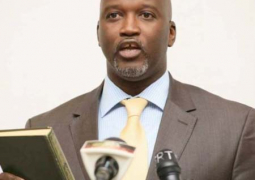Lawyer Moses Richards on 19 September 2012, before Magistrate Dawda Jallow of the Kanifing Industrial Tribunal, challenged and put a banker, Abake Williams, to task after she testified in a case involving Emmanuel Ena George, who has sued Prime Bank for wrongful termination.
In summary, Abake Williams, who testified in favour of the bank, told the tribunal that the transaction which the plaintiff, Emmanuel Ena George, entered was one in which a supplier of foreign currency sold euro to Prime Bank and the bank paid the supplier the equivalent in dalasi.
However, she added, the transaction was presented as the supplier selling the bank US Dollar and then the bank paying in dalasi.
She stated that the dollar that was in the middle of the transaction did not exist.
Williams added that all the time of the transaction where the supplier had dollar to sell to the bank for dalasi, it was sold at D31 plus but the euro at the market at that point was about D41.20 thereabout.
“So, in essence, if you converted the euro to dollar, then you sold the dollar to the bank, then you will make more money,” the witness told the tribunal.
She further said that unfortunately for the supplier, there was no dollar, but it was presented as if he sold dollar and the bank bought the dollar.
She posited that the bank bought the euro at a higher rate.
This was the time when Moses Richards rose and asked the witness whether she was an accountant by profession and Mrs Williams said she was.
Richards asked her whether she had any banking experience, and she answered in the positive.
“Can you tell the tribunal your previous banking experience?”Richards questioned.
“I worked for Prime Bank from April 2009 to June 2011,” Mrs Williams said.
She was asked how much banking experience did she have over that period, but she said it was only the years she had indicated.
“What were your roles and responsibility?” asked Richards.
“I was the head of finance looking at all the financial transactions of the bank,” she replied.
“Are those financial transactions related to internal or external banking?” Richards inquired.
“All,” the witness said.
She was asked to tell the tribunal what a foreign currency shipment was.
She testified that it was where you had a customer of the bank banking in their own foreign currency requesting that the bank transports it on their behalf to an off-shore account of theirs and they pay a fee.
“Does the bank also ship foreign currency of its own?” Richards asked.
“That is correct,” the witness said.
“It is true, is it not, in foreign currency shipment the physical cash does not have to come to the bank. It is by way of instructing, and debit and credit?”Richards questioned.
“That is not correct,” Mrs Williams answered.
It was put to her that when a customer requests the bank to ship a foreign currency on his/her behalf, the actual physical cash does not have to come to the bank, but she said that was not correct, adding that Richards was referring to two different things.
“Now explain those two different aspects,” Richards challenged.
“Where a customer requests for a shipment, he or she brings the cash to the bank and we ensure that his or her account off-shore is credited. How is that done is entirely left to the bank. The second one is that the customer does not have the foreign currency, but the bank has it. So the customer would ask the bank to sell them the foreign currency and advise that the bank account be credited,” explained Mrs Williams.
“So it is true therefore that there are situations where the physical cash does not come for shipment,” Richards put it to her.
“That is not a shipment. It is a transfer,” she said.
“But notwithstanding, accounts are debited and credited,” stated Richards.
“That is correct,” said Mrs Williams.
The case was adjourned till today and/or tomorrow.



